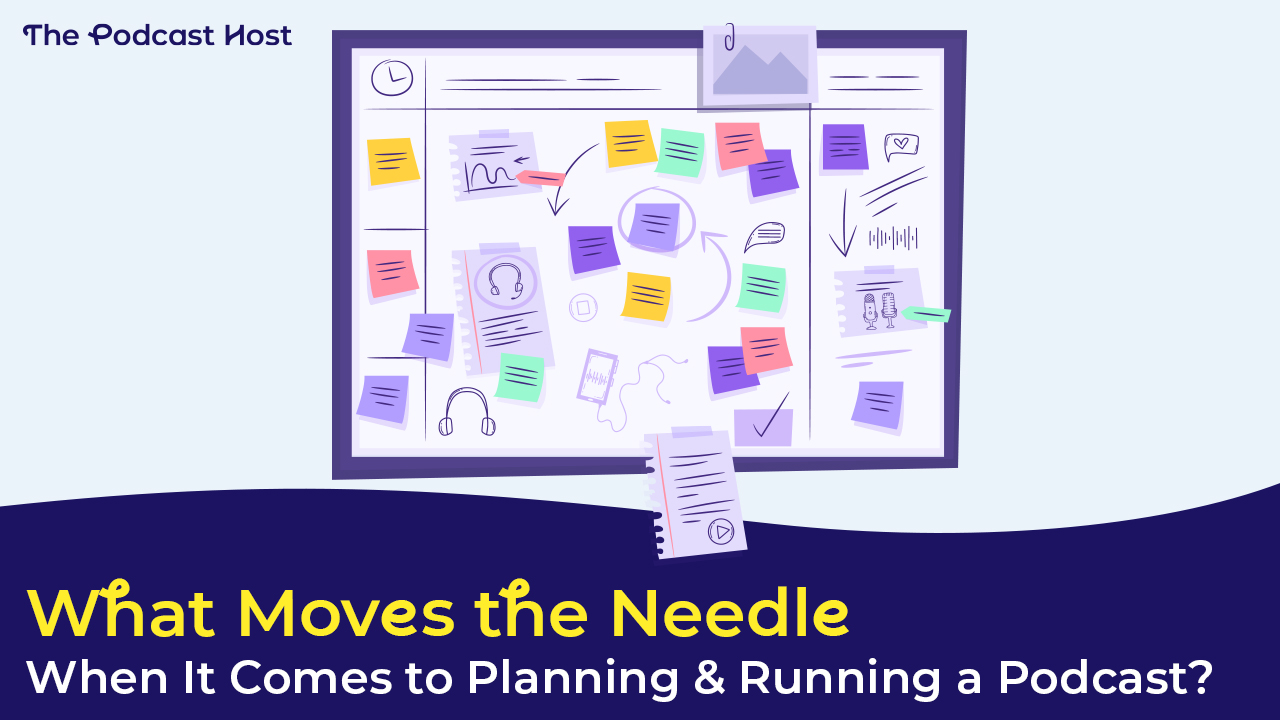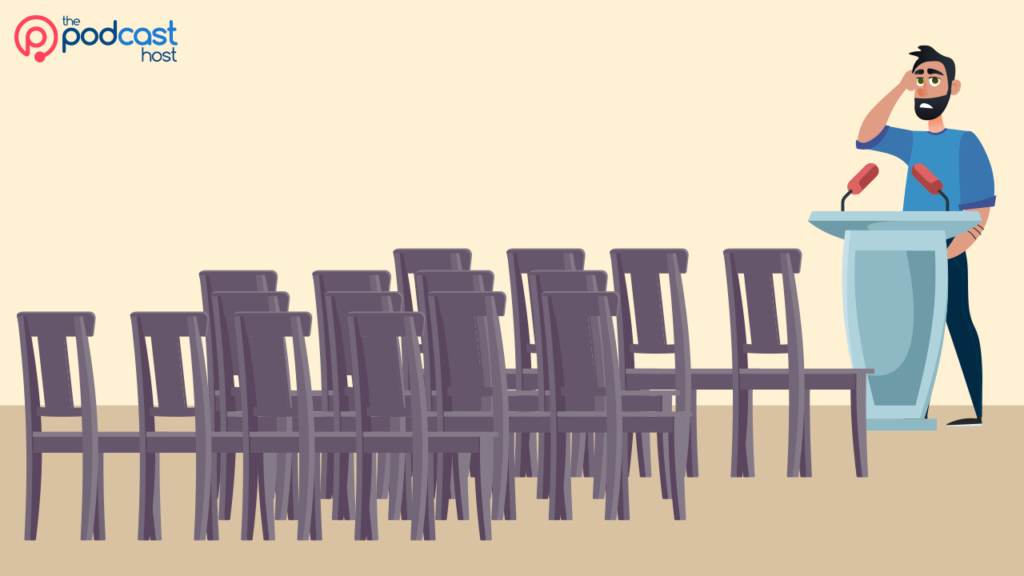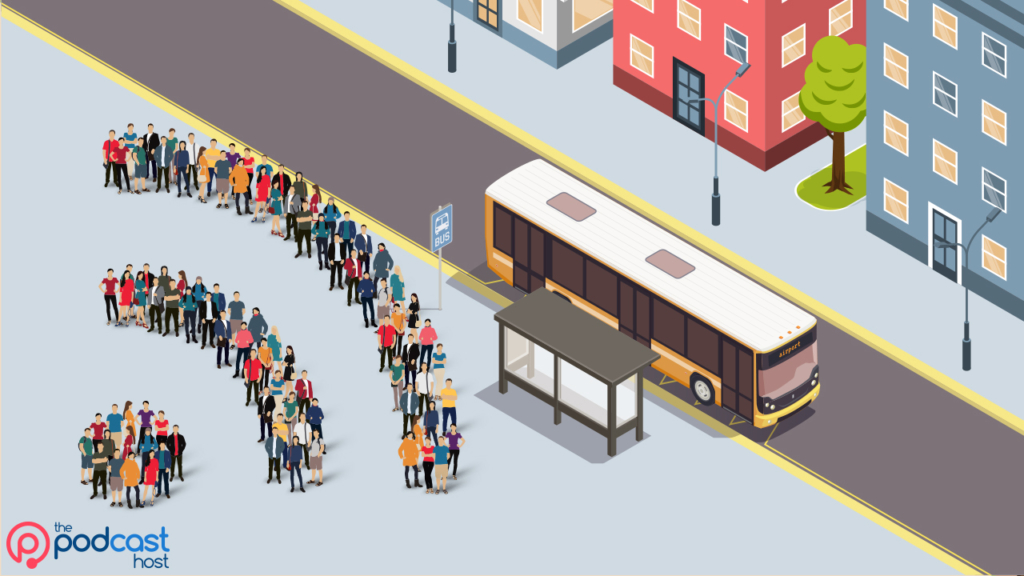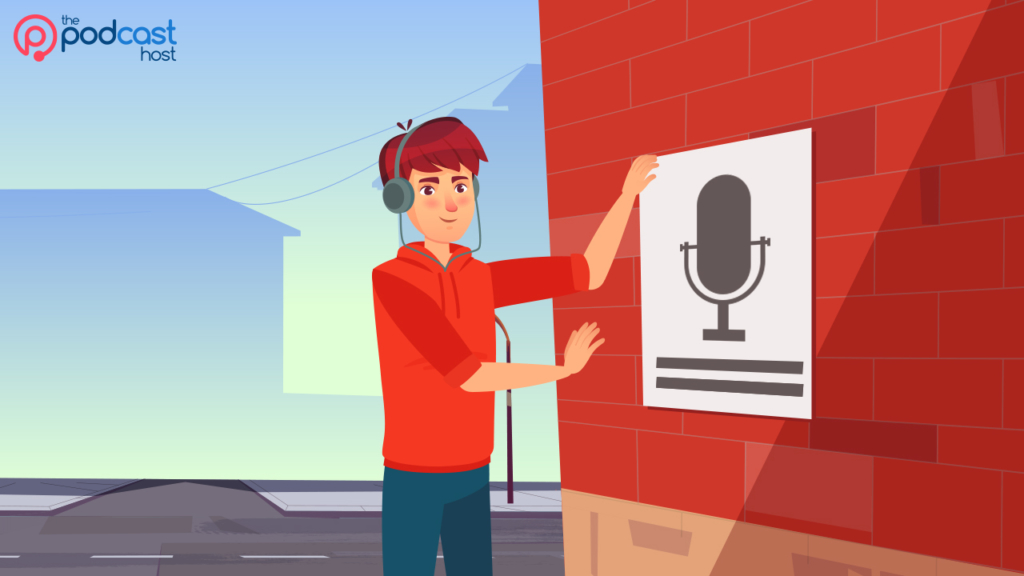What Moves the Needle When It Comes to Planning & Running a Podcast?

There’s no shortage of things to focus on when it comes to planning, launching, and running your own podcast.
From buying the right mic and choosing a hosting platform, to coming up with a show name and sorting out your cover art, these all fall under the umbrella of “podcasting”. But all podcasting tasks aren’t created equally. Some of the things you do can have a huge impact on your show’s success, whilst others can be little more than a distraction.
On this episode of Podcraft, we decided to reflect on a combined 20+ years of podcasting. Of all the podcasts we’ve launched and ran between us in that time, which factors do we feel helped move the needle?
Also mentioned in this episode were our Podcraft community and the Portuguese translations of some of our top articles.
Podcasting Factors That Move the Needle (Or Don’t)
We both scored each of the following out of 10 (10 for very important, 0 for not important at all), added up the scores, and ranked them into an overall list. The aim was for new and aspiring podcasters to help decide whether they were spending too much time on one thing, or not enough time on something else.

1. Defining Your Target Audience
The most important factor was identifying who you want to reach, and why. Not spending some time nailing this down in the planning stages can lead to your content being directionless and vague. You want new listeners to hear your podcast and think “this is exactly what I’ve been looking for.”
For more help with this, check out the following articles:
- What’s Your USP?
- Demographics Vs Psychographics
- How to Create a Value Proposition
- How to Create Your Avatar
- How to Come up With a Unique Topic
2. Deciding on Your Podcast’s Name
Naming your podcast can feel like a tricky barrier to overcome. It’s also a very important one. If potential listeners don’t immediately know what your show’s about when they see it, then many of them will skip past it without even reading the description. With podcast names, there’s no such thing as “boring”. If you come up with an ultra-descriptive “as it says on the tin” name and it isn’t already taken – grab it.
For more on this, check out How to Name Your Podcast.
3. Your Episode Titles
This is another huge factor in turning traffic (your target audience, searching for your topic) into listeners. Descriptive and compelling episode titles will help your show be found, and they’ll also encourage those searching to hit play. Don’t waste this important space by putting the word “episode” in there. You don’t need to write your podcast name beside every episode title either.
For more on this, check out How to Title Your Episodes.
4. Your Recording Environment
It might be surprising to some that this factor is more important than the actual gear you record with. But it is. You can get away with using the lowest-quality equipment in a good-sounding environment, but use the best mic on earth in a bad room and you’ll sound amateurish. Prioritise where you record over what you record with.
For more help with this, check out the following articles:
- How to Create a Silent Home Studio
- What is Reverb & How Do I Fix It?
- DIY Podcast Studios
- Acoustic Blankets for Podcasting
5. Your Website
Having a central home online for your show is important. If you ever want to build an email list, sell a product or service, or offer any sort of extra content via your podcast, then having a show website will make this a lot easier. Traffic, just like downloads, brings a lot of potential opportunities too. The benefits of having your own site are huge, and it has never been simpler to make one, either.
For more help with this, check out our free course on how to make your own podcast website.
6. Your Episode Release Frequency
A consistent release frequency can help set expectations for potential new listeners. If folks see that you’re releasing new episodes on a weekly (or even daily!) basis, then they can see that you’re committed and serious about your show. A more sporadic release schedule won’t be a dealbreaker for most listeners, but if you’re podcasting in a crowded market this can give you an extra edge against shows competing for the same audience.
For more on this, check out How Often Should I Release New Episodes?
7. Your Recording & Editing Software
This one isn’t important in the sense that you should spend ages thinking about it. Any “good” recording and editing software should do its job well to the point that you no longer really need to think about it or take notice of it. There are loads of great options on the market when it comes to podcasting software. Some are more tailored to folks who want to become master audio producers, whilst others are designed to keep things as simple as possible. Choose the one you feel is most appropriate to your own situation, then stick with it.
For more help with this, check out the following articles:
- Best Podcast Software
- Best Podcast Editing Software
- Best Podcast Recording Software
- Best Remote Recording Tools
8. Your Cover Art
Some podcast listeners do judge a show by its cover. Having an eye-catching podcast logo can work in tandem with some of the other key factors mentioned here. Let’s be clear that it’s unlikely any potential listener will find your show and think the episodes look compelling, but decide not to hit play because of your cover art. That said, if there are lots of alternative shows promising similar content, low-quality cover art might lead to those listeners going elsewhere.
For more on this, check out How to Make Great Podcast Cover Art.
9. Your Show Format
Any type of podcast format (from interviews to co-hosted, to solo) can be done well (or poorly, for that matter). The good thing about formats is you can experiment and adjust them. It might take a few episodes to settle on one that lets you present your content in the best light. You don’t need to have this fully nailed down right out of the gate.
For more on this, check out The Ultimate Guide to Podcast Formats.

10. Your Hosting Platform
The place you upload your show (as well as distribute it to everywhere podcasts are found) is important in the sense that it’s essential to have one. However, it’s actually quite hard to find a bad hosting service these days. Some hosting platforms have unique tools and features, but really, all run on the sample principles and few are truly unique. Your show won’t live or die based on where you host it, and no media host can promise you more downloads or faster growth. The onus for success is on the podcaster. A hosting platform will give you the tools to do the job, but the rest is up to you.
For more help with this, check out the following articles:
11. Your Episode Lengths
Some data suggests that more listeners feel put off by longer episodes than shorter ones. However, the most popular podcasts on the planet tend to have long episodes of an hour or more (sometimes, much more). The key takeaway is that there’s no magic ideal episode length that’ll ensure the success of your show. Let the content dictate the length, try to keep each episode in a rough ballpark, then stop worrying about this.
For more on this, check out How Long Should a Podcast Episode Be?
12. Your Mic & Equipment
This might be surprisingly low on the list for many. After all, choosing a mic seems like such a big and important moment for the aspiring podcaster. The reality is that, like media hosts, you’ll struggle to find a truly bad microphone on the market these days. As we’ve covered already, your sound will be much more heavily influenced by your recording environment than it will from your mic or equipment. You don’t need to spend a lot of time or money on this. Just pick something and move on to the more important task of actually talking into the thing.
For more help with this, check out the following articles:
13. Social Media
It’s the default assumption by many content creators that “you need to be on social”. Of course, there are examples of podcasters who’ve “done well” on social media and use it as part of their podcast growth strategy. For many people though, the pros of being on these platforms are vastly outweighed by the cons. There are likely much better things you can be spending time on when it comes to improving and growing your show. If you absolutely must use platforms like Facebook and Twitter, at least avoid doing so on your phone, and in an ad-hoc manner.
For more on this, check out Do Podcasters Need Social Media?

14. Your “Launch”
Launching your podcast is a gradual process rather than one big event. The worst thing about people hyping up “the launch” as something grand and all-important is the disappointment that often follows. Few people care about brand new podcasts. Downloads can trickle in when you’ve only got a couple of episodes under your belt and nobody has heard of you. This can lead to new podcasters feeling like they’ve failed. It can even lead to them quitting altogether. Your podcast won’t live or die based on how it performs in those first few weeks though. It’s what you do for the next couple of years that matters.
For more on this, check out Does My Podcast “Launch” Even Matter?
What Next?
The aim here is that you can use this as a guide when planning and running your next podcast. If you can spend more of the time on the stuff that matters, then your podcast has more chance of lasting the pace and having the desired impact in the long run.
Of course, if you’ve just had the biggest fanciest “podcast launch” ever, before going on to find thousands of new listeners on Twitter later that day, then all power to you 😀
